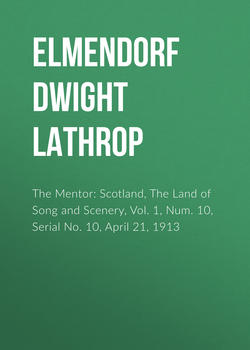Читать книгу The Mentor: Scotland, The Land of Song and Scenery, Vol. 1, Num. 10, Serial No. 10, April 21, 1913 - Elmendorf Dwight Lathrop - Страница 1
SCOTLAND
Robert Burns’ Cottage
ОглавлениеONE
Few poets singing in dialect become world famous. This is true for the simple reason that a dialect poet is likely to be local – to write of local things – to avoid the universal. But Robert Burns – “poor Burns,” as we think of him – was the exception. Who does not know “Auld Lang Syne” and all that it means? Or who has not said to himself in his own way, “A man’s a man for a’ that?”
Robert Burns could not help but be a poet of the people – the “peasant poet.” He was born close to the soil of Scotland. On January 25, 1759, he opened his eyes in a small cottage about two miles from Ayr, in Scotland. His father was only a small farmer, and Robert got very little education, but lots of hard work.
However, he managed to learn to read, and used to carry his books into the fields with him to snatch a few moments’ reading during the day. At meal times he sat with a spoon in one hand and a book in the other. He liked best the ballads of Scotland – the old songs of the minstrels.
But in 1781 he went to Irvine to learn the trade of a flax-dresser. And it was here that he indulged two habits that clung to him all the rest of his life – drinking and falling in love. For the poet was a boon companion at a feast and a great heartbreaker – but his own heart was broken also many times.
His fortunes fell very low in 1786, and he intended to sail for the West Indies, there to try to better them. But his first volume of poetry proved to be such a great success that he did not go. His poems took the people by storm. Everyone read them. He was invited to Edinburgh, where he became the lion of the hour.
But all this did not bring him in much money. Finally, in 1789 he got a position as excise officer. But as the years went on, and he grew wilder and wilder in his dissipations, friends drew away from him. His only companions were those of the lowest classes.
At last, on July 4, 1796, he knew that he was dying. He wrote on the twelfth to his cousin for a loan of fifty dollars, to save him from passing his last days in jail. He died on the twenty-first of July, 1796.
The Burns Cottage, near Ayr is reverently preserved as a memorial to the poet. Here is the little room where he was born, and here are to be found many mementos associated with his life. This cot, built of clay by Burns’ father, is a shrine for those who love the memory of the “peasant poet.”
